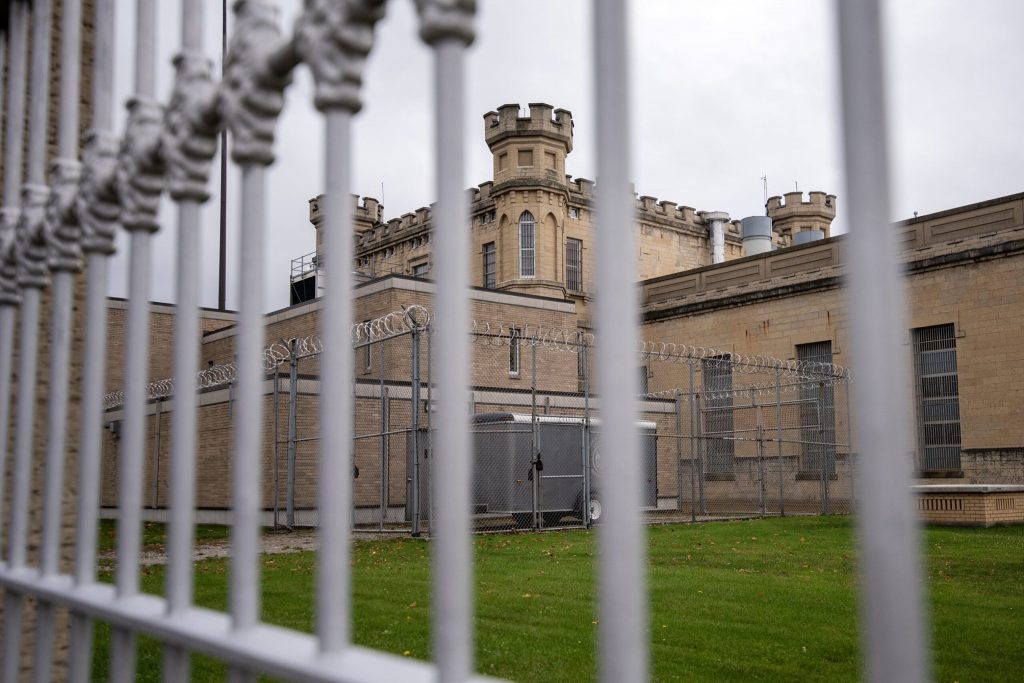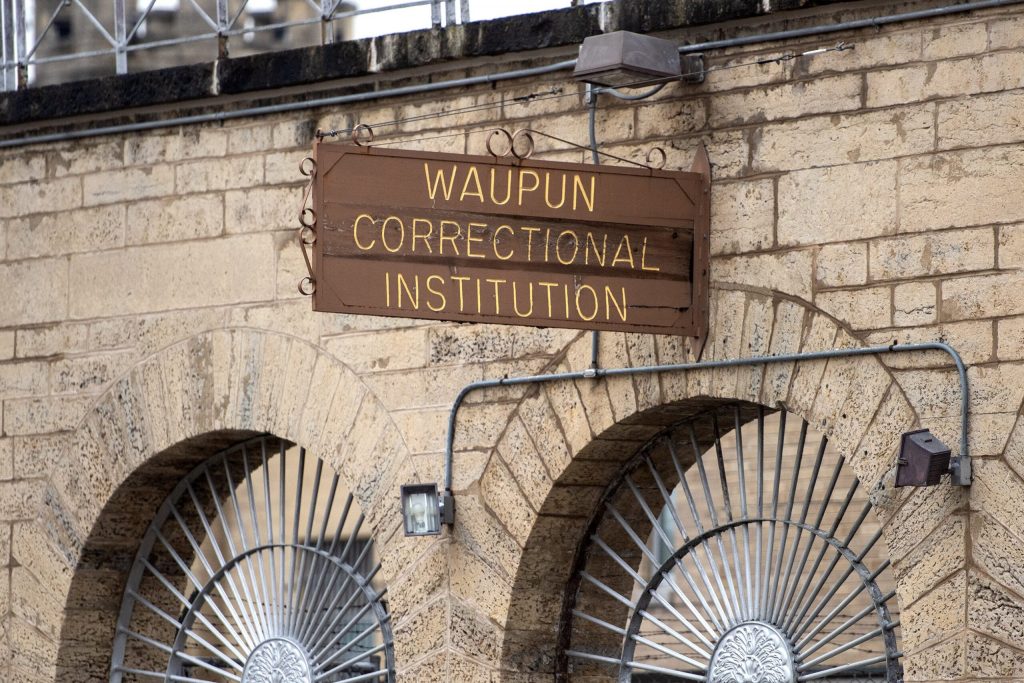Criminal Justice Reform Advocates Blast ‘Lack of Urgency’ in Closing Green Bay Prison
Budget signed by Evers called for max security facility to close, but governor removed deadline.
Criminal justice reform advocates say they’re disappointed by the lack of a deadline in a recently approved plan to close the notorious Green Bay prison.
But when he signed the budget last month, Evers used a line-item veto to strike the reference to 2029, which made the prison’s closure date indefinite.
In his veto message, Evers reiterated that the 19th-century prison must close, but said it would be irresponsible to set a specific timeframe when the Legislature has not provided a “real, meaningful, or concrete plan to do so.”
The governor said that includes plans to provide job security for the more than 300 people who work at the prison, as well as figuring out what will happen to the more than 1,000 men currently incarcerated at the facility, which is in Allouez near the city of Green Bay.
“Just saying, in a budget, ‘Well, we’re going to close in 2029’ is not a solution,” Evers told WPR’s Wisconsin Today last month. “We have to get the other pieces in place, and I’m willing to work with anybody on the other side to make this happen.”
Those calling for the closure included state lawmakers representing the area, the Allouez Village Board, Brown County’s sheriff and prison reform activists.
First built in the late 1800s, GBCI has been plagued by faulty plumbing, outdated security infrastructure, overcrowding and violence. Last fiscal year, its operating budget was about $40 million, and state officials say the facility is need of costly repairs.
The most recent Department of Corrections data shows GBCI is over its 749-person capacity by 379 people — more than 50 percent. That’s forced many prisoners there to double up in cells that were built for one person. This summer, an inmate at Green Bay was sentenced to life in prison after he allegedly murdered his cellmate.
‘It hurts:’ Activist says of failed promises to reduce Wisconsin’s prison population
After Evers’ latest budget proposal, Marianne Oleson, an activist with Ex-Incarcerated People Organizing of Wisconsin, hoped that Green Bay Correctional might finally close.
EXPO has been urging Wisconsin officials to reduce the state’s prison population so that the Green Bay facility can shut down and not be replaced with another prison. Oleson called Evers’ partial veto “disheartening.”
“GBCI is a crumbling, inhumane facility that should have been shut down years ago, and delaying its closure signals a lack of urgency around the need to transform our approach to public safety,” Oleson said. “It hurts. It hurts when we’ve had promises to reduce the prison population.”
Evers first took office in 2019, and he campaigned on a promise to reduce Wisconsin’s prison population. At one point, he said he’d like to see the state’s prison population cut in half.
But after taking a temporary dip during the COVID-19 pandemic, Wisconsin’s prison population has continued to rise. There are now roughly 23,000 people locked up in the state’s prisons — a figure that has more than tripled since 1990.
Meanwhile, many of Evers’ criminal justice reform proposals have met opposition in the GOP-majority Legislature. In February, Evers put forth a half-a-billion-dollar plan to reorganize the state’s prison system. Along with closing GBCI, it included expanding the state’s earned release programs for nonviolent offenders and eventually reducing the DOC’s prison bed capacity by about 700 people.
He pointed to the history of Wisconsin’s Lincoln Hills youth prison, which remains open despite a 2018 state law which set a deadline for its closure in 2021. Once that youth facility closes, it will free up some space for adult beds, since prison officials plan to convert it to a medium-security adult prison.
“Yes, we have to close Green Bay. There’s no question about that. We’re going to do it,” Evers told “Wisconsin Today.” “We just can’t say, ‘Well, tomorrow we’re going to close Green Bay, and those 1,000 people are going to be going — where? We don’t know.”
Lack of deadline meets criticism from both sides of the aisle
The enacted version of the new two-year budget includes $15 million for realignment and planning within the Department of Corrections so GBCI can eventually shut down.
After Evers signed the budget, two Republicans representing the Green Bay area, state Rep. Benjamin Franklin and Rep. David Steffen, issued a joint news release criticizing the removal of Green Bay’s decommissioning deadline.
“Only in government would four and a half years be too short of a deadline to finalize the closure of a crumbling building,” Steffen said in a statement. “While another opportunity and deadline has come and gone, I will not rest until that facility is closed.”
On the other of the side of the political spectrum, state Rep. Ryan Clancy, D-Milwaukee, said eliminating the deadline makes it “deeply unlikely” that GBCI will ever close.
“This profoundly disappointing action is a betrayal of Evers’ 2019 promise to reduce Wisconsin’s prison population by half,” Clancy wrote on social media.
Legislature strips funding to close Waupun from budget
Evers’ original prison plan also would have used $245 million to convert the Waupun Correctional Institution, another maximum-security facility, into a medium-security prison focused on job training for inmates.
Funding for Waupun’s conversion, however, was eliminated by the Republican-controlled Legislature.
That’s a shame, said Tom Denk, a formerly incarcerated Wisconsinite who now advocates for criminal justice reform through an organization called WISDOM. He said turning Waupun into a vocational village would have helped the men there prepare for a productive life outside prison.
“They don’t want the other party to get credit,” Denk said of Wisconsin politicians. “And some of it is just philosophical difference when it comes to how much people should be punished and how much should be about rehabilitation and being able to redeem yourself.”
Waupun Correctional is even older than GBCI, and criminal justice reform advocates have joined some state lawmakers in calling for it to shut down, citing safety concerns. Those calls grew after Waupun’s former warden and multiple other former employees were charged with felonies last year, after prosecutors alleged their neglect caused the deaths of two inmates. Waupun’s mayor and other local leaders in that area have been staunchly opposed to closing Waupun, however.
Amber Edwards, a community organizer in northeast Wisconsin, says conditions at the Waupun and Green Bay prisons are unsafe for the people who work and are incarcerated there.
Edwards works for a group called JOSHUA which has been staging monthly protests, calling for GBCI’s closure.
Since Evers has announced that he won’t seek a third term, Edwards says she’s concerned that, without a firm deadline, a new governor may backpedal on closing Green Bay.
But she says, even if that happens, the protests will continue.
“It will grow and it will multiply until these places are cared for and closed in the way that the governor’s original budget proposal had laid out,” Edwards said.
Criminal justice reform advocates blast ‘lack of urgency’ on plans to close Green Bay prison was originally published by Wisconsin Public Radio.
If you think stories like this are important, become a member of Urban Milwaukee and help support real, independent journalism. Plus you get some cool added benefits.
























